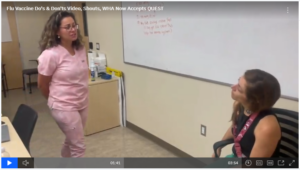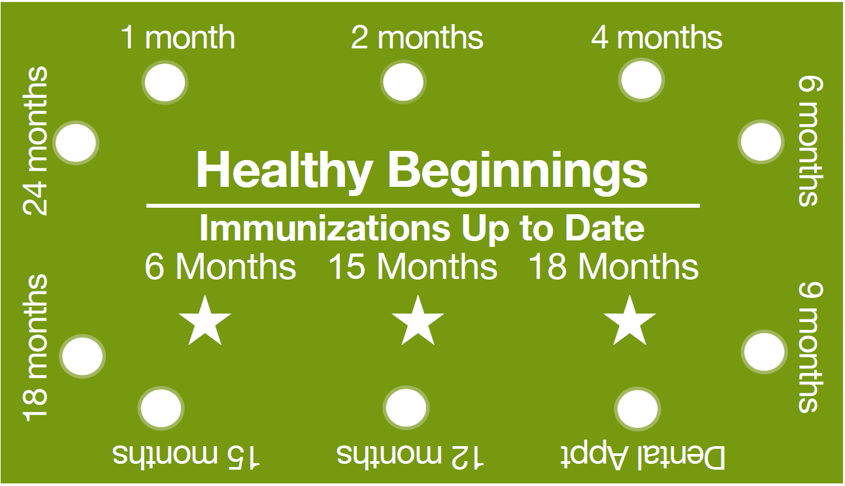Petaluma Health Center is a large community health center serving over 40,000 patients across two counties in California. It operates five main sites, including two rural West Marin locations and a shelter-based clinic alongside multiple mobile sites, with plans to open a large acute care site.
Petaluma provides primary, chronic disease, and acute care, focusing on underserved populations, including immigrants, those living in poverty, and individuals lacking access to quality care.
The health center serves a pediatric population largely covered by Medi-Cal. Located about 35-40 minutes north of San Francisco, it also reaches patients in rural coastal communities, including ranching families in West Marin. Petaluma’s population health data shows that 35 percent of its patients identify as Spanish speaking.
As a participant in PHMI, Petaluma receives grant funding, in-person and virtual peer learning opportunities, one-on-one technical assistance, coaching, and subject matter expertise on population health management, health information technology, equity, and social health.
“We're really proud to be a practice innovator and an organization that's increasingly working to ensure we are representative of the patient communities we serve in our staff,” says Rachel Joseph, Family Nurse Practitioner, Director of Quality Improvement and PHMI Lead at Petaluma Health Center. “There’s a lot of energy and momentum there for us.”
Using this momentum, Petaluma’s PHMI team is innovating to address and improve outcomes for its Population of Focus, Children, and improve metrics for well-child visits and immunizations. See highlights from three of these innovations—Huddle TV, Community Patient Portal Trainings, and the Diaper Incentive Program—below.
Huddle TV
The flu vaccine is a topic that is historically challenging for Petaluma’s patient population amidst misinformation and ambivalence.
“Often, even when families accept the vaccine, children might not get the recommended doses by their second birthday, despite being otherwise up to date,” says Joseph.
Petaluma’s team wanted to address staff pain points in having conversations with families about the flu vaccine, so they came up with a new communication tool for providers call

ed “Huddle TV.” This multi-part video series features role-playing between lead staff members and aims to inform staff about new practices, engage them with new initiatives, remind them of strategic priorities, and humanize important issues. It includes examples of how to offer the vaccine and dispel myths, along with encouragement and tips for having these conversations.
Each team room at the health center is equipped with a large TV screen that staff see first thing in the morning as they prepare for their daily huddle. The broadcasts are shown at the center's two main sites and are also available online through the intranet for staff to view at their convenience.
While specific data on the program’s impact has not yet been collected, the team is in the process of developing a run chart to analyze how parts of the intervention relate to flu vaccine uptake. Anecdotally, staff engagement has been positive, with feedback noting that providers appreciate the content, especially when it incorporates humor. The videos have been well-received, and providers have expressed gratitude for the training.
Additionally, the team launched a letter campaign to complement Huddle TV, sending personalized letters to families with children under two, including photos of care team members and messages addressing misconceptions and explaining why vaccinations are important. Joseph’s team plans to include data from the campaign in its run chart to measure its combined impact with Huddle TV and other interventions.
Community Patient Portal Trainings
When Petaluma found data showing that Spanish speakers were using their patient portal at half the rate of English speakers, they decided to host community training sessions.
“We’re really excited about these patient portal trainings. The purpose is twofold,” Joseph explains. “First, we aim to collect essential health information from families and patients before their visits. Second, we want to ensure equitable access to features like scheduling, asking clinical questions, and getting timely prescription refills—basically, all the advantages [the patient portal] offers.”
Petaluma’s team developed a semi-structured curriculum and launched their training program with an evening session. To encourage participation, they made more than 100 outreach calls, secured RSVPs, and served a pupusa dinner sourced from a local vendor. Their dedication resulted in a modest yet meaningful turnout, with four adults representing 15 children attending the event.
Feedback from these sessions informed a shift to hosting a daytime training, which included snacks and recruitment from waiting areas during clinic hours, resulting in slightly higher participation. As they work to grow the program, they are partnering with a nonprofit mobile clinic, the Botanical Bus, to host patient portal trainings at the end of community workshops for Spanish speakers, providing lunch to encourage attendance.
Reactions to the trainings have been positive, according to Joseph.
“People have been surprised by the functionality of the health record, excited to be able to make appointments without having to call or come to the clinic physically,” she says. “This eliminates waiting in long queues and ensures they can get what they need without unnecessary barriers.”
To assess overall effectiveness, the team uses pre- and post-surveys to evaluate participant knowledge and tracks participants’ patient portal utilization activity, such as logging in, making appointments, and accessing test results for their child and messaging with providers.
“It’s nice to provide a space where people can gather in community and feel supported.”
Diaper Incentive Program
In recognizing the need for more community support and with a history of successfully incentivizing preventive care, Petaluma developed a Diaper Incentive Program for patients and their families.
“We know it’s expensive to live and even more expensive to be a parent. There’s a lot of unmet need in our community,” says Joseph. “So, we brainstormed ways to celebrate kids in our target population. We considered a few ideas, like toddler car seats, before deciding on diapers. They’re practical, portable, and don’t require much education to distribute.”
The program aims to encourage specific health behaviors by offering diapers as incentives for completing six well-child checks and receiving two doses of the flu vaccine by 15 months. While it may not persuade those who are already opposed to vaccination, it appeals to families who might be motivated by the reward, encourages families to take action, and recognizes those already committed to their child's health.
The program uses a wallet-sized stamp card provided at the initial newborn visit or for children up to 14 months, along with educational materials and a welcome letter in the family’s primary language.

Joseph noted that half of the families who participated in their first patient portal training were there because they had heard about the Diaper Incentive Program.
“We're now considering how to integrate the diaper incentive with other education or services,” she says.
Huddle TV has also been used to promote the diaper incentive program, reminding staff to discuss the program with patients and reinforcing the availability of this benefit as part of public health service uptake.
PHMI Support for Petaluma Innovation
According to Joseph, PHMI grant funding has been essential for Petaluma Health Center.
“It’s allowed us to step away from other duties to focus on innovating and iterating,” she says. “It also brought in new perspectives from folks not in senior leadership, which is really important.”
Support from Petaluma’s PHMI Coach, Denise Armstroff, has been particularly impactful; her focus on measurement and data has ensured that their initiatives are evidence-based. She has also provided encouragement and guidance, helping the team overcome challenges like limited staffing and resources, and has connected them with peers and best practices, which has been highly beneficial.
Ultimately, she says, PHMI grant funding has facilitated deeper, more meaningful conversations that have accelerated change within the center.